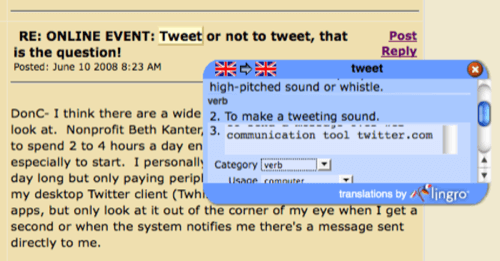Lingro is a fantastic collaborative dictionary and translation service that combines open dictionaries on the web with user contributions under a CreativeCommons license. It’s particularly useful for people reading in a second language who just need help with a few unusual words now and again. Anyone will find the basic two-click dictionary lookup feature useful though.

The service is very feature rich, but the easiest way to use it is with a javascript bookmarklet. One click of the bookmarklet makes every word on the page you’re on clickable for an instant dictionary pop-up. You can add your own definitions right in the same pop-up. For many of the words there are audio pronunciations provided, too.
The limitations of low-context translations are well established, but the primary limitation to the service’s usefulness right now is that it only supports European languages, and Spanish. (By that I mean, here in the US it’s hard to think of Spanish as a European language since the vast majority of Spanish speakers are from Latin America! Chill out, angry commenters!) You can see the list of languages and statistics about how well they are developed on Lingro here.
The company was the subject of a long interview yesterday on the CreativeCommons blog, where co-founder Paul Kastner discusses many of the advanced features such as the ability for website owners to bake Lingro right into their pages automatically. That might be a good fit for ReadWriteWeb, given the international readership we have.
You can also upload whole files from your desktop and have them translated on the fly.
The bookmarklet in action, article continued below.

Lingro also keeps track of web pages you translated and words you looked up on your personal home page. All of that is using cookies, no account creation is required to use the service or add definitions. That’s great, the service is really easy to use.
The collaborative dictionary builder gives anyone an opportunity to enter definitions of unsolved words in a variety of languages. Know what the words rapporteur, harmonise or feedingstuffs mean? Lingro users could use your help!
Kastner explained how the dictionary builder works and the basic philosophy of the project in the following paragraph from the CC interview:
Once someone has chosen a language pair they’re fluent in, the builder shows them a list of words missing from that particular dictionary, ordered by how common they are in the language (the word “the” would be near the top, while “onomatopoeia” is further down). They can also see sentences showing the words used in context to help recall the meanings. These are the same kinds of tools used by the big publishers to create their dictionaries – we’re not just opening up the dictionaries themselves, we’re opening the entire process of creating them.

















